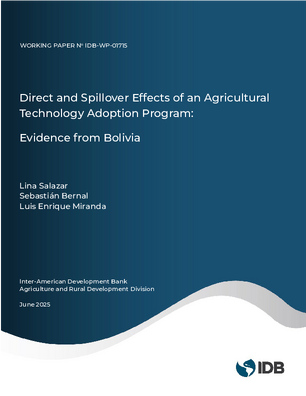Direct and Spillover Effects of an Agricultural Technology Adoption Program: Evidence from Bolivia
Date issued
Jun 2025
Subject
Crops;
Technology Adoption;
Municipal Government;
Agricultural Productivity;
Agrotechnology;
Food Security;
Agricultural Production;
Climate Change;
Impact Evaluation
JEL code
O13 - Agriculture • Natural Resources • Energy • Environment • Other Primary Products;
O33 - Technological Change: Choices and Consequences • Diffusion Processes;
Q12 - Micro Analysis of Farm Firms, Farm Households, and Farm Input Markets;
Q16 - R&D • Agricultural Technology • Biofuels • Agricultural Extension Services;
Q18 - Agricultural Policy • Food Policy
Country
Bolivia
IDB series
Impact Evaluations
Category
Working Papers
This study employs an experimental approach to estimate both the direct and indirect effects (i.e. spillovers) of an agricultural technology adoption program on small landholder farmers in Bolivia. Specifically, the evaluation focuses on the second phase of the "Creación de Iniciativas Agroalimentarias Rurales" (CRIAR) program, which aimed to increase agricultural productivity, income, and food security among smallholder farmers through technology adoption. Implementing a two-stage randomized experiment, the study uses instrumental variable (IV) analysis to measure the local average treatment effect (LATE) of the program. The survey sample includes 1,684 farmers, consisting of direct beneficiaries, contaminated control households, and pure control households. Findings reveal statistically significant direct effects on household income, total production value, sales, technology adoption, and crop diversification. The results also suggest that most of the direct effects intensify over time. Furthermore, the analysis confirms the presence of spillover effects, supporting the hypothesis that farmers residing near program beneficiaries receive indirect benefits.
Generative AI enabled




